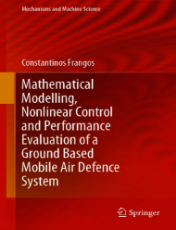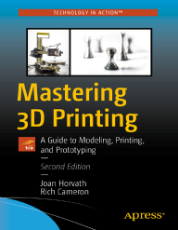To expand the knowledge of the ponykind, post scientific and technological papers and books here.
/cyb/ - Cyberpunk Fiction and Fact
Cyberpunk is the idea that technology will condemn us to a future of totalitarian nightmares here you can discuss recent events and how technology has been used to facilitate greater control by the elites, or works of fiction
7 replies | 9 files | 2 UUIDs | Page 6
1690096845.jpg (162.3 KB, 1280x720, Twilight_Sparkle_reading_S4E09.jpg)
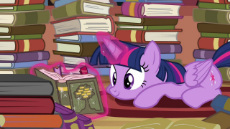
1690097230_2.png (260.5 KB, 762x1007, C++ Primer (5th Edition) - (BOOK COVER).png)
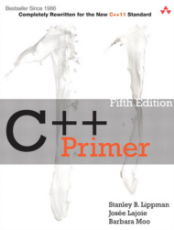
C++ Primer (5th Edition) - (by Stanley Lippman, Josée Lajoie, and Barbara Moo)
-----
>This is a beginner book.
>Introductory level with no previous programming experience.
>Coming at 1k pages, this is a very thorough introduction into C++ that covers just about everything >in the language in a very accessible format and in great detail.
>The fifth edition (released August 16, 2012) covers C++11.
-----
>Review:
>About 20 years ago Stan Lippman wrote the first edition of this book. At the time of writing it was among the best introductions to C++ published. A few years later the author produced a 2nd edition which tracked changes that were happening to the C++ language as it was being standardised. Soon after the C++ Standard was finalised the 3rd edition was published with a surprise second author, Josée Lajoie (well it was a surprise to me). Josée is a gifted teacher who at that time was working for IBM. She is a French Canadian but her English fluency would shame many for whom it is their first language. I know this from personal experience because she effectively mentored me during my first five years of active participation in WG21, giving freely of her insights and being very patient with this jumped up amateur. Her skills took a good book and turned it into an authoritative one.
>Soon after the TC that updated C++ in 2003 a 4th edition appeared. This had acquired yet another new author, Barbara Moo who has many years of programming experience and a real gift for writing about the most obtuse technical points with great clarity. She co-authored 'Ruminations on C++' with Andy Koenig (her husband, and author of what must be the longest running programming book without amendments, C Traps and Pitfalls, as relevant today as it was when it was first published in 1989). Ruminations on C++ is still a delight to read and is a model of how to write about technical things in a readable style. (If you have never read Ruminations on C++, get a copy and enjoy it.)
>Barbara completely rewrote The C++ Primer (I do not know how much input came from Stan Lippman, and I guess none from Josée as she had moved on to academia and, as far as I know, was no longer programming in C++). I guess that Andy Koenig could not resist reading over her shoulder and making the odd suggestion now and again. The resulting book was even better than the 3rd edition (much better in my opinion, but that is not to belittle the previous editions).
>And now C++ has undergone a major overhaul with 'making it easier to teach' being one of the criteria and so it is clearly time for yet another edition.
>This time two things have been done, the text has been revised. However well you write the first time you think of better ways to express yourself when you come back to it after a few years. Comparing the 4th and 5th edition side by side shows that the authors (again I suspect that is mostly Barbara) have taken the text of the 4th edition and reworked it. The second thing is that the code and content has been completely revised to make use of the changes that C++11 introduced.
>C++ is a vast language and any author writing an introduction must select what they intend to cover. I believe that the authors have made sensible decisions as to what to cover and what to omit. The only area that I cannot find (I am working from a draft without an index) that I think I would have covered is lambda functions. Those are at least as useful, and arguably simpler, as parameter packs and variadic templates which are covered.
>There is the additional problem with writing a book so soon after the release of the new standard; many compilers have not fully caught up with all the new bits but this is rapidly changing.
>The authors write on the assumption that readers would be better off using a command line. That is a point with which I disagree. I much prefer to have novices use an IDE (such as Code::Blocks) with as up-to-date a version of g++ as I can get (currently I am using 4.7). However this does not really matter, just use whatever you are comfortable with.
>If you are in the target readership, those with either a talent for programming or with some prior programming experience in another language (or possible C++ some years ago) then I can confidently say that this book will introduce you to C++ and set your feet firmly on the road to mastering the language.
>This is not a book for those who are already relatively fluent in C++ as it was and wanting to update themselves to the latest version. Those people will need to look elsewhere. But if friends, colleagues or relatives want to learn heavy duty C++ and have some prior programming experience point them at this book and warn them that they need this edition and not an earlier one.
-----
>This is a beginner book.
>Introductory level with no previous programming experience.
>Coming at 1k pages, this is a very thorough introduction into C++ that covers just about everything >in the language in a very accessible format and in great detail.
>The fifth edition (released August 16, 2012) covers C++11.
-----
>Review:
>About 20 years ago Stan Lippman wrote the first edition of this book. At the time of writing it was among the best introductions to C++ published. A few years later the author produced a 2nd edition which tracked changes that were happening to the C++ language as it was being standardised. Soon after the C++ Standard was finalised the 3rd edition was published with a surprise second author, Josée Lajoie (well it was a surprise to me). Josée is a gifted teacher who at that time was working for IBM. She is a French Canadian but her English fluency would shame many for whom it is their first language. I know this from personal experience because she effectively mentored me during my first five years of active participation in WG21, giving freely of her insights and being very patient with this jumped up amateur. Her skills took a good book and turned it into an authoritative one.
>Soon after the TC that updated C++ in 2003 a 4th edition appeared. This had acquired yet another new author, Barbara Moo who has many years of programming experience and a real gift for writing about the most obtuse technical points with great clarity. She co-authored 'Ruminations on C++' with Andy Koenig (her husband, and author of what must be the longest running programming book without amendments, C Traps and Pitfalls, as relevant today as it was when it was first published in 1989). Ruminations on C++ is still a delight to read and is a model of how to write about technical things in a readable style. (If you have never read Ruminations on C++, get a copy and enjoy it.)
>Barbara completely rewrote The C++ Primer (I do not know how much input came from Stan Lippman, and I guess none from Josée as she had moved on to academia and, as far as I know, was no longer programming in C++). I guess that Andy Koenig could not resist reading over her shoulder and making the odd suggestion now and again. The resulting book was even better than the 3rd edition (much better in my opinion, but that is not to belittle the previous editions).
>And now C++ has undergone a major overhaul with 'making it easier to teach' being one of the criteria and so it is clearly time for yet another edition.
>This time two things have been done, the text has been revised. However well you write the first time you think of better ways to express yourself when you come back to it after a few years. Comparing the 4th and 5th edition side by side shows that the authors (again I suspect that is mostly Barbara) have taken the text of the 4th edition and reworked it. The second thing is that the code and content has been completely revised to make use of the changes that C++11 introduced.
>C++ is a vast language and any author writing an introduction must select what they intend to cover. I believe that the authors have made sensible decisions as to what to cover and what to omit. The only area that I cannot find (I am working from a draft without an index) that I think I would have covered is lambda functions. Those are at least as useful, and arguably simpler, as parameter packs and variadic templates which are covered.
>There is the additional problem with writing a book so soon after the release of the new standard; many compilers have not fully caught up with all the new bits but this is rapidly changing.
>The authors write on the assumption that readers would be better off using a command line. That is a point with which I disagree. I much prefer to have novices use an IDE (such as Code::Blocks) with as up-to-date a version of g++ as I can get (currently I am using 4.7). However this does not really matter, just use whatever you are comfortable with.
>If you are in the target readership, those with either a talent for programming or with some prior programming experience in another language (or possible C++ some years ago) then I can confidently say that this book will introduce you to C++ and set your feet firmly on the road to mastering the language.
>This is not a book for those who are already relatively fluent in C++ as it was and wanting to update themselves to the latest version. Those people will need to look elsewhere. But if friends, colleagues or relatives want to learn heavy duty C++ and have some prior programming experience point them at this book and warn them that they need this edition and not an earlier one.
>>2662
>The fifth edition (released August 16, 2012) covers C++11
Ignore that book.
That's fucking old I'm afraid. The current standard is C++20.
>The fifth edition (released August 16, 2012) covers C++11
Ignore that book.
That's fucking old I'm afraid. The current standard is C++20.
Anonymous
No.2697
Re-post from >>>/mlpol/366504 →
That book belongs better here at /cyb/
Mathematical Modelling, Nonlinear Control and Performance Evaluation of a Ground Based Mobile Air Defence System - (by Constantinos Frangos)
>This research monograph deals with the dynamic modelling, nonlinear control and performance evaluation of a ground based mobile air defence system (ADS).
>The present work complements existing references on ground based ADSs ([69, 108, 142]). The afore-mentioned publications deal mainly with static or non-mobile ADSs, that is, ADSs that are deployed at a fixed location. This research monograph deals with a mobile ADS that consists of an armoured ground vehicle with an integrated rotating turret and anti-aircraft (AA) gun.
The math involved might look overwhelming for the STEM newbie fag but it is only the appetizer on the way to a 24/7 autonomous robotic system guarding the backyard.
That book belongs better here at /cyb/
Mathematical Modelling, Nonlinear Control and Performance Evaluation of a Ground Based Mobile Air Defence System - (by Constantinos Frangos)
>This research monograph deals with the dynamic modelling, nonlinear control and performance evaluation of a ground based mobile air defence system (ADS).
>The present work complements existing references on ground based ADSs ([69, 108, 142]). The afore-mentioned publications deal mainly with static or non-mobile ADSs, that is, ADSs that are deployed at a fixed location. This research monograph deals with a mobile ADS that consists of an armoured ground vehicle with an integrated rotating turret and anti-aircraft (AA) gun.
The math involved might look overwhelming for the STEM newbie fag but it is only the appetizer on the way to a 24/7 autonomous robotic system guarding the backyard.
Anonymous
No.2699
Mastering 3D Printing - A Guide to Modeling, Printing, and Prototyping - (by Joan Horvath, and Rich Cameron)
>2nd Edition, 2020
>We have been astonished at how much the 3D printing industry has changed since the first edition of this book, which was published in 2014.
>Amazingly little has remained constant since then, except perhaps for a sense of wonder about what might be possible. That sense now is informed by more sober realities about the challenges that remain, as well as more realistic ideas about good applications.
>In this book, we want to give you a path to get started with 3D printing, as well as enough insight to go a considerable distance down the road to using it to create useful things. 3D printing still is not all that straightforward, and we have tried to create a balance between telling you enough so you can get started without drowning in too much detail and not telling you enough. We have minimized the use of step-by-step screenshots, for example, since those get out of date quickly. Instead, we have given a few examples and tried to tell you what we were doing and why, so that you can do the same thing in whatever system you are using.
>2nd Edition, 2020
>We have been astonished at how much the 3D printing industry has changed since the first edition of this book, which was published in 2014.
>Amazingly little has remained constant since then, except perhaps for a sense of wonder about what might be possible. That sense now is informed by more sober realities about the challenges that remain, as well as more realistic ideas about good applications.
>In this book, we want to give you a path to get started with 3D printing, as well as enough insight to go a considerable distance down the road to using it to create useful things. 3D printing still is not all that straightforward, and we have tried to create a balance between telling you enough so you can get started without drowning in too much detail and not telling you enough. We have minimized the use of step-by-step screenshots, for example, since those get out of date quickly. Instead, we have given a few examples and tried to tell you what we were doing and why, so that you can do the same thing in whatever system you are using.
Anonymous
No.2700
1693024081_2.png (376.4 KB, 764x989, C++ All-in-One For Dummies - (BOOK COVER).png)
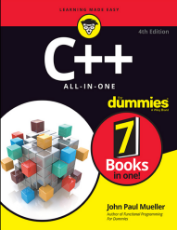
>>2696
>The fifth edition (released August 16, 2012) covers C++11
>Ignore that book.
I've got the right one and updated to the standard used by most fags, C++ 20. And unlikely the >>2662 one, this one is easy to follow and it is literally for dummies. Seriously, with this one you may have a chance to learn something new and perhaps to hit a job.
C++ All-in-One For Dummies - (by John Paul Mueller)
>4th Edition published on 2021.
>Get ready for C++20 with all you need to know for complete mastery!
>Your comprehensive and updated guide to one of the world’s most popular programming languages is here!
>Whether you’re a novice or expert, you’ll find what you need to get going with the latest features of C++20.
>The workhorse of programming languages, C++ gives you the utmost control of data usage and interface and resource allocation.
>If your job involves data, proficiency in C++ means you’re indispensable!
>This edition gives you 8 books in 1 for total C++ mastery.
>Inside, internationally renowned expert John Paul Mueller takes you from the fundamentals of working with objects and classes to writing applications that use paradigms not normally associated with C++, such as those used for functional programming strategies.
>The book also includes online resources such as source code.
>You discover how to use a C++ GNU compiler to build applications and even how to use your mobile device for coding.
>The fifth edition (released August 16, 2012) covers C++11
>Ignore that book.
I've got the right one and updated to the standard used by most fags, C++ 20. And unlikely the >>2662 one, this one is easy to follow and it is literally for dummies. Seriously, with this one you may have a chance to learn something new and perhaps to hit a job.
C++ All-in-One For Dummies - (by John Paul Mueller)
>4th Edition published on 2021.
>Get ready for C++20 with all you need to know for complete mastery!
>Your comprehensive and updated guide to one of the world’s most popular programming languages is here!
>Whether you’re a novice or expert, you’ll find what you need to get going with the latest features of C++20.
>The workhorse of programming languages, C++ gives you the utmost control of data usage and interface and resource allocation.
>If your job involves data, proficiency in C++ means you’re indispensable!
>This edition gives you 8 books in 1 for total C++ mastery.
>Inside, internationally renowned expert John Paul Mueller takes you from the fundamentals of working with objects and classes to writing applications that use paradigms not normally associated with C++, such as those used for functional programming strategies.
>The book also includes online resources such as source code.
>You discover how to use a C++ GNU compiler to build applications and even how to use your mobile device for coding.
>>2696
No, it's an excellent book. I consider Stroustrup's own PPP2 to be the literal best programming textbook for serious students (regardless of language). But for C++ beginner's, Lippman's 5E book is a close second.
No, it's an excellent book. I consider Stroustrup's own PPP2 to be the literal best programming textbook for serious students (regardless of language). But for C++ beginner's, Lippman's 5E book is a close second.
Anonymous
No.2728
